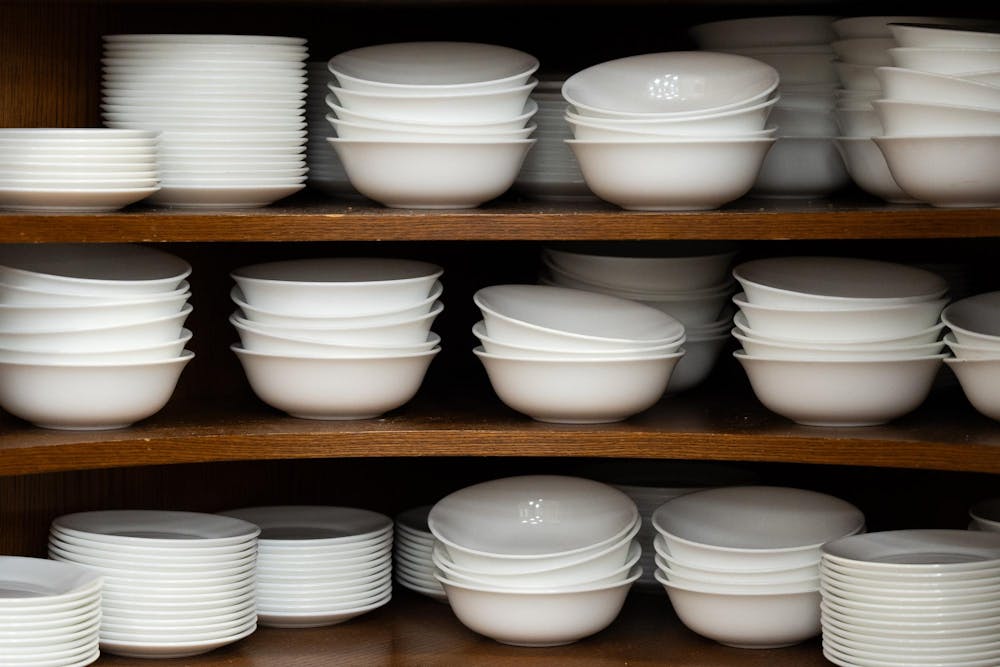In the past two years, the University has spent over $73,000 replacing plates, bowls, and silverware in dining halls, according to data obtained by The Daily Princetonian.
University data shows that Choi dining hall, located in Yeh College and New College West, has alone spent nearly $44,000 in the past two years replacing 4,440 plates and 2,240 bowls. The remaining $29,000 comes from replacing 20,400 forks, 5,460 knives, 5,580 bouillon [soup] spoons, and 2,520 teaspoons.
The expense mainly comes from individuals pocketing dishes and other tableware from the dining hall and taking them into common spaces and dorm rooms. A spokesperson for the University said that they expect 10–15 percent of the tableware to break, meaning that about $62,470–$66,145 is spent on replacing lost tableware.
For comparison, tuition for the 2024-25 academic year is $62,400.
Dirty plates are frequently scattered around the Yeh and NCW common spaces. Jaime Chen ’25, a Yeh RCA, told the ‘Prince’ that when RCAs are on-call — shifts where they monitor students on nights out — looking after those dishes is a considerable part of their job.
“Most of the things that we log are really just issues of dishes being left around the college,” Chen said. After those logs, the RCAs are instructed to remind their Zees to return dishes to the dining hall and keep common spaces clean.
The college staff is well aware of the issue. Last spring, the Yeh college office included a graphic at the top of its weekly newsletters to students that read, “Keep our halls free from mice and pests! Return dishes to the dining hall and clean up any trash left behind!” Additionally, there was a “Yeh Community Cleanup” day on April 29, with pictures advertising the day including stacks of dishes in common spaces.

Residents have observed mice due to dirty plates left in common spaces. Sophia Vernon ’27, who lives in New College West, said she had to file a Facilities work order last year after she found mice in her room on the fifth floor of Addy Hall.
“There’s sometimes mice even on higher floors because people take so many dishes with food on them up to their rooms,” she told the ‘Prince.’ “And then, of course, the mice go where the food is.”
Campus Dining is also aware of the issue, but Assistant Vice President of Campus Dining Nadeem Siddiqui says he isn’t too concerned.
“I think their intent is to bring it back,” Siddiqui told the ‘Prince’ in an interview. “I think part of it is that, unfortunately, [students are] scheduled. I don't think anybody is intentionally taking it.”

“We have custodial staff on each floor that have been always helpful to see something [and] will bring it back to us … It would be nice to have things come back,” he continued. “I think things have improved, at least since I’ve been here. But the plates over at Yeh/West are the nicest ones, so they seem to have more legs than others. I think that’s just the nature of it.”
The $36,000 annual cost of replacing tableware is only 0.08 percent of the Campus Dining budget, which Siddiqui says is about $42 million. Siddiqui told the ‘Prince’ that if the cost was reduced, the money would go towards reducing Campus Dining’s subsidy from the University.
“We would have less subsidy, which we want to do, because that money can go [towards] much better causes at the University and the mission they have,” Siddiqui said.
Siddiqui says that soon-to-be-built dining halls will be built in the same setup as Yeh/NCW.
“I think the intent we’re moving towards is that the cashier will be just in the servery area and open seating for everybody to kind of come together,” Siddiqui said. “You want people to meet with you who are not on the meal plan. They should be able to eat together without having to worry about them.”
“Forbes is on a renovation path right now, and, when Hobson opens, they’ll [both] have the same structure as the Yeh/West cashier,” Siddiqui continued. “When you’re building community, it’s really difficult to say, ‘you’re [in] an eating club like you don’t have a meal plan.’ Let’s just say you want to meet somebody here, either you have to pay to eat a meal that you don’t want [or] have a discussion.”
“It doesn’t seem to me a very good structure for a residential program — nickel-and-diming students when you really want to feel like everybody’s equal and they can have a connection,” he said. “That’s how Princeton is moving.”
Charlie Roth is a senior News editor, assistant Data editor, education director, and Sports contributor for the ‘Prince.’
Please send any corrections to corrections[at]dailyprincetonian.com.








